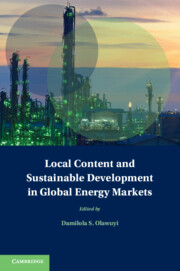Refine search
Actions for selected content:
24 results
Guerrilla Lawyering: Mobile Resistance in China’s Environmental Public Interest Litigation
-
- Journal:
- Law & Society Review ,
- Published online by Cambridge University Press:
- 04 September 2025, pp. 1-27
-
- Article
-
- You have access
- Open access
- HTML
- Export citation
Autocrats and Their Business Allies: The Informal Politics of Defection and Co-optation
-
- Journal:
- Government and Opposition , First View
- Published online by Cambridge University Press:
- 26 August 2025, pp. 1-19
-
- Article
-
- You have access
- Open access
- HTML
- Export citation
1 - States’ Interactions with Their National Communities Abroad
-
-
- Book:
- States and their Nationals Abroad
- Published online:
- 04 December 2024
- Print publication:
- 05 December 2024, pp 1-32
-
- Chapter
- Export citation
10 - Conclusion
- from Part IV - Consequences of Inclusion
-
- Book:
- The Patriarchal Political Order
- Published online:
- 30 November 2023
- Print publication:
- 14 December 2023, pp 270-284
-
- Chapter
- Export citation
5 - The Two Logics of Autocratic Rule
- from Part II - Theory
-
- Book:
- The Two Logics of Autocratic Rule
- Published online:
- 06 April 2023
- Print publication:
- 13 April 2023, pp 111-128
-
- Chapter
- Export citation
4 - Co-optation
- from Part II - Theory
-
- Book:
- The Two Logics of Autocratic Rule
- Published online:
- 06 April 2023
- Print publication:
- 13 April 2023, pp 91-110
-
- Chapter
- Export citation
Autocracies as “Organized Certainty”?
- from Part I - Introduction
-
- Book:
- The Two Logics of Autocratic Rule
- Published online:
- 06 April 2023
- Print publication:
- 13 April 2023, pp 3-24
-
- Chapter
- Export citation
Come Together: Far-Right Parties and Mainstream Coalitions
-
- Journal:
- Government and Opposition / Volume 59 / Issue 3 / July 2024
- Published online by Cambridge University Press:
- 03 April 2023, pp. 633-654
-
- Article
-
- You have access
- Open access
- HTML
- Export citation
2 - A Theory of Opposition Candidacy
-
- Book:
- Activist Origins of Political Ambition
- Published online:
- 08 July 2022
- Print publication:
- 21 July 2022, pp 35-77
-
- Chapter
- Export citation
6 - Endogenizing Governmental Power Sharing and Its Effect on Civil War
- from Part II - Analyzing the Effect of Power Sharing on CivilWar
-
- Book:
- Sharing Power, Securing Peace?
- Published online:
- 23 June 2022
- Print publication:
- 07 July 2022, pp 97-125
-
- Chapter
- Export citation
7 - The Strategic Logic of Governmental Power Sharing and Civil War
- from Part II - Analyzing the Effect of Power Sharing on CivilWar
-
- Book:
- Sharing Power, Securing Peace?
- Published online:
- 23 June 2022
- Print publication:
- 07 July 2022, pp 126-148
-
- Chapter
- Export citation
5 - Pathways of Failure
-
- Book:
- The 'Fall' of the Arab Spring
- Published online:
- 31 March 2022
- Print publication:
- 07 April 2022, pp 160-192
-
- Chapter
- Export citation
3 - Authoritarian Political Opportunity Structures in Comparative Perspective
- from Part I - Members of the Club or the Only Game in Town?
-
- Book:
- Legacies of Repression in Egypt and Tunisia
- Published online:
- 10 March 2022
- Print publication:
- 10 March 2022, pp 100-124
-
- Chapter
- Export citation
2 - Incomplete Democratization, System Transformation, and the Civil Service: A Case Study on the Weimar Republic and the Nazi Regime in Germany
-
-
- Book:
- Democratic Backsliding and Public Administration
- Published online:
- 17 August 2021
- Print publication:
- 26 August 2021, pp 22-46
-
- Chapter
- Export citation
Betting on the Wrong (Trojan) Horse: CSR and the Implementation of the UN Guiding Principles on Business and Human Rights
-
- Journal:
- Business and Human Rights Journal / Volume 6 / Issue 2 / June 2021
- Published online by Cambridge University Press:
- 22 June 2021, pp. 312-325
-
- Article
-
- You have access
- Open access
- HTML
- Export citation

Local Content and Sustainable Development in Global Energy Markets
-
- Published online:
- 05 March 2021
- Print publication:
- 04 March 2021
4 - Nakivale
-
- Book:
- The Global Governed?
- Published online:
- 06 March 2020
- Print publication:
- 26 March 2020, pp 53-69
-
- Chapter
- Export citation
7 - Conclusion
-
- Book:
- The Art of Political Control in China
- Published online:
- 18 November 2019
- Print publication:
- 05 December 2019, pp 181-192
-
- Chapter
- Export citation
5 - Co-optation
-
- Book:
- The Art of Political Control in China
- Published online:
- 18 November 2019
- Print publication:
- 05 December 2019, pp 120-153
-
- Chapter
- Export citation
Trading privileges for support: the strategic co-optation of emerging powers into international institutions
-
- Journal:
- International Theory / Volume 11 / Issue 3 / November 2019
- Published online by Cambridge University Press:
- 08 October 2019, pp. 318-343
-
- Article
-
- You have access
- Open access
- HTML
- Export citation
